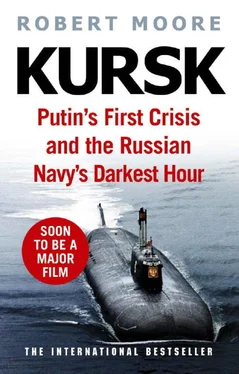The Memphis crew was feeling lucky. This was the submarine’s second Arctic patrol in two years. The first had lasted three tension-filled months, from April to June 1999 – the ‘best deployment ever’, the officers agreed. And now they were up in the Barents again, in the high summer of 2000, watching the Northern Fleet with every piece of equipment that Navy intelligence could think of: acoustic sensors, an experimental fibre-optic periscope, and a state-of-the-art sonar that worked at greater range than ever before.
The Memphis was not only an attack submarine – she was an experimental platform for a range of these advanced technologies. In 1989 she was withdrawn from fleet service and modified before being reassigned to Submarine Development Squadron Twelve – DEVRON 12, as it’s called – which specializes in improving submarine tactics. On this mission, a brand-new navigational system was also being tested that allowed the submarine to be manoeuvred by measuring tiny differences in gravity along the ocean floor. The prototype technology was proving a major success, moving the US submarine fleet a generation ahead of that being used by their Russian counterparts.
Throughout the patrol, Breor had kept his crew in a state of vigilance called ‘augmented watch section’, often used while operating in the sensitive waters off Russia’s north west coast. Additional watch officers and enlisted specialists are placed on duty in the command centre and in the sonar and radio rooms. The only state of alert higher is ‘battle stations’, which mobilizes the entire crew.
Travelling at an ultra-stealthy three knots, the Los Angeles-class nuclear attack submarine was in her element. The diving officer stared intently at the consoles to gauge the submarine’s angle and depth. At all costs, he wanted to avoid broaching, when the boat moves unexpectedly upward and breaks the surface – a disaster for the mission but one that can be easily caused by changing water temperatures or a lapse in concentration.
The forward part of the Memphis was crowded with intelligence ‘spooks’. Some of these analysts and linguists were in the radio room recording intercepted communications; others were in the sonar room, seeking to track and decipher any acoustic anomalies.
This Northern Run, as the submariners call these spy missions in Arctic waters, had been scheduled to last six weeks but had been extended by another fourteen days. The USS Toledo , another Los Angeles-class boat, which was taking over sentry duty in the Barents Sea, had been delayed and was due to arrive on station by 13 August. The Memphis was now on her final day’s patrol. Tomorrow, Breor would give the order to withdraw to the north-west and the Memphis would travel along a pre-designated corridor of sea around the North Cape, before heading due south down the Norwegian coast. The crew members were already excited, anticipating the long passage home. Tired minds were turning to thoughts of family reunions on the piers of the New London submarine base.
For the last several days, the Memphis ’s radio and sonar rooms had been handling a huge amount of data. The communications traffic of the Russian naval exercise reached a peak as the warships and submarines performed their complex dance. For the last forty-eight hours, the Memphis ’s sensors had been picking up and recording the sounds of numerous Russian missile launches and torpedo firings.
Four separate Russian submarines had been identified by their acoustic signatures and by their radio traffic: the giant Delta IV ballistic-missile sub the Karelia , the attack boats the Boriso-Glebsk and the Daniil Moskovsky , and finally the formidable Oscar II multi-purpose missile attack submarine the Kursk . Above them, and to the north-east, was the flagship of the Fleet, the battle cruiser the Peter the Great .
Late that Saturday morning, the Russians seemed to be going through the final steps of the exercise, with their submarines launching their practice torpedoes. As the Memphis ’s specialists covertly eavesdropped on these operations, nothing forewarned Breor of the startling sounds he was about to overhear. No intercepts or sonar plots suggested anything was amiss.
At precisely 11.28 a.m., a powerful shock wave rang through the hull of the Memphis . Even from a distance of sixty-five nautical miles, it was audible to those without earphones. Submarine sensors flared wildly, and sonar operators immediately reported the news to the command team in the attack centre, unable to suppress the surprise in their voices. Then, just as Breor called for more information and a ‘classification’, the Memphis was rocked by a second, even more powerful explosion.
What the hell had just happened?
Breor at first assumed the explosion was part of the naval exercise, probably a massive depth charge or the detonation of a SS-N-16 Stallion missile on an underwater target. Nothing in his technical training or command experience led him to question this belief. The spooks on board are partly there to make educated guesses about intelligence-gathering opportunities – to anticipate what is about to happen. But this time, they had heard nothing to prepare the Memphis for the giant blasts. There had been no intercepted communications suggesting test explosions on this scale were imminent.
For Breor, the event quickly coalesced into two related and equally pressing questions: was the Memphis in immediate danger? Had her covert mission been compromised?
Signalling news of the mystery underwater blasts to his Fleet commanders was out of the question. Shooting high-frequency data into the Arctic sky and up to the military communications satellite overhead would only alert the Russians to the presence of an American spy sub. The absolute rule of Barents Sea patrols is to be invisible to the enemy and to do nothing that betrays your presence.
Breor would break strict radio silence only if he judged that matters of overwhelming national security were at stake. If he overheard the countdown to an act of war, such as the preparation for the launch of a nuclear missile, or if his submarine was under torpedo attack, he would send an emergency signal. Otherwise, jeopardizing your covert status or embarrassing your political masters back home is the ultimate submariner’s sin. In any case, Breor knew that other US detection systems would pick up the detonations.
The sonar operators aboard the Memphis replayed the sounds of the mystery blasts again and again, passing them through a low-frequency analyser, trying to tease out any clues as to their source. Even after twelve long hours, the specialists were confused about what they had recorded.
Then late in the evening of 12 August, just before Breor began the submarine’s scheduled withdrawal to make way for the Toledo , the spooks in the radio room alerted him to a dramatic rise in Russian radio traffic to and from the exercise area.
All around the Barents Sea, on frequencies that were reserved for emergencies, naval communications circuits were bursting into life. Shore stations and surface warships transmitted a frenzied cacophony of signals. The Russian linguists in the Memphis ’s radio room listened, almost overwhelmed by the volume, and quickly translated any messages that were not encrypted.
From the volume and content of the communications alone, Breor realized he was no longer watching over a routine naval exercise. Something extraordinary had happened out there, an event so sudden and troubling that it appeared to be generating a kind of panic among the seasoned Northern Fleet commanders.
Читать дальше












